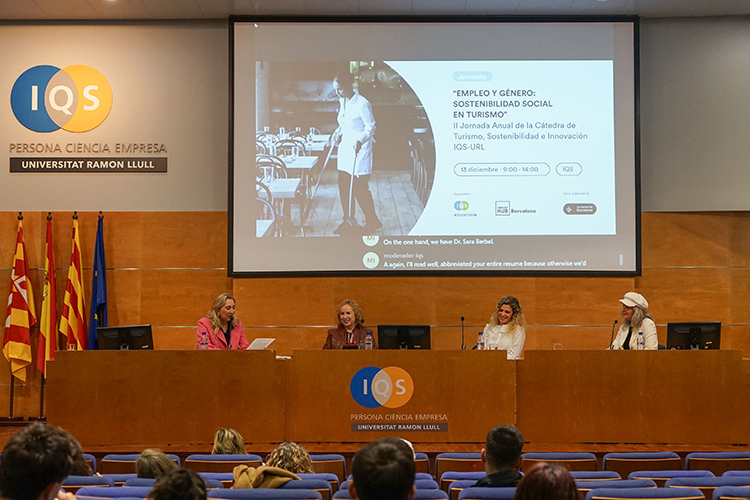The Tourism Sector Debates the Importance of Social Sustainability as a Driver of Change at IQS

Industry professionals, employment experts, and gender and social entrepreneurs gathered on 13 December to hold a debate on “Employment and gender: social sustainability in tourism” within the framework of the 2nd Annual Conference of the IQS-URL Department of Tourism, Sustainability, and Innovation, organized by IQS and featuring collaboration with the Barcelona City Council.

Industry professionals, employment experts, and gender and social entrepreneurs gathered on 13 December to hold a debate on "Employment and gender: social sustainability in tourism" within the framework of the 2nd Annual Conference of the IQS-URL Department of Tourism, Sustainability, and Innovation, organized by IQS and featuring collaboration with the Barcelona City Council.
Within a context of social sustainability, today's tourism model demands a profound transformation. With this starting point, the department's second annual conference represented a meeting place to openly expose, analyse, and debate the great challenges faced by a sector marked by precariousness and low-quality employment, difficulties in retaining talent, and gender inequalities in particular, the focal point of this event. The conference also put on the table a unanimous and imminent call to move from words to action and make the transformation of the sector effective.
"It's important that the theme of this edition is ‘Employment and gender: social sustainability in tourism,’ because it demonstrates our commitment at IQS not only to sustainability and tourism, but also to gender issues. And not as ‘greenwashing’ or because it's fashionable, but because it is an issue that concerns us as an institution, that should concern us as a country and as a society, and because we are able to take to a few days to give it the dimension it deserves," explained Dr Salvador Borrós, director of IQS. He was accompanied at the opening ceremony by Dr Flavio Comim, Dean of the IQS School of Management, and Dr Gilda Hernández-Maskivker, director of the Tourism, Sustainability, and Innovation Department at IQS.
Up and down in a sector undergoing transformation
The tourism sector is one of the world's leading employers: one in ten jobs is associated with tourism according to the United Nations International Labour Organization (ILO). However, it is also a sector marked by job insecurity. But what does precariousness entail? “It is often mistakenly associated with a temporary nature. For me, precariousness is the result of a historical process that involves labour flexibility policies that companies end up using to adjust costs to their needs and public policies of a neoliberal nature. The sum translates into a permanent weakness and the insecurity of the working class in the field of tourism," explained Ernest Cañada, a labour geographer and tourism expert with Alba Sud during his presentation "Tourism employment and precariousness," based on his own study on housekeepers, one of the most affected groups.
Other challenges are also present in addition to an already complex precariousness. In Spain, tourism is also a highly feminized sector in which women represent 60% of the workforce, according to the World Tourism Organization (UNWTO), although only 34% hold leadership positions. They also find employment in the most precarious jobs and earn 20% less than men on average.
Faced with the perception of the housekeepers in his study, who describe their work as "submission," there is an extended version stating that "tourism improves the lives of women because it generates employment that, thanks to its flexibility, enables them to earn an income while they can continue with their caregiving responsibilities," Cañada explained. As a starting point to reverse the situation, Cañada calls for critical reflection and asks: "Is this really the case, or do companies benefit from structural inequalities and internalize them?"
The event made it clear that the gender gap in the tourism industry is a reality, and ending it is a priority. "The initial title of my presentation was 'Tourism and the gender gap: reality and solutions,' but it is too late to simply talk: today I want to make an urgent call to action," urged Mireia del Pozo, president of the European Centre for Women's Studies. The expert recalled that, last September, the headline in the media was that employment in Spain had increased like never before. "We should avoid only focusing on positive data and learn to analyse and cross-reference all the data," del Pozo said.
In this sense, del Pozo focused on the situation in Spain in terms of biases and how companies apply them in communications, human resources, welfare, culture, and sustainability. "Spain comes up short, with an average score of between 3 and 3.5," according to the data used to work on the 2030 Agenda with the European Commission, she said, “which means that Spain does not understand how to take advantage of what it has at a legal, technological, or talent level." Therefore, she insisted on the pressing need for a change that involves internalizing the gender perspective.
Through obligation or conviction
Moving into action was also discussed at the two roundtables that complemented the event. "Precariousness, a multifaceted crisis, and paradigm shift" were the key words used to describe the current situation in the tourism sector by the participants in the roundtable on employment. Moderated by Dr Ricard Santomà, vice-dean of Tourism at the IQS School of Management, the speakers included Héctor Suárez, coordinator of the Baix Llobregat Delegation of the Training and Employment Foundation; Dr Claudio Milano, professor, consultant, and Ramón y Cajal Fellow at the University of Barcelona; and Xavier Martín, CEO of Turijobs. "The tourism sector must change, through conviction or obligation. Either that, or there will be no professionals who want to work in tourism," said Martín, founder of the largest employment platform in the sector.
In terms of gender, change involves not only implementing equality policies and plans, but also giving visibility to women in the sector. This emerged from the roundtable moderated by Dr Daniela Freund, coordinator of the IQS Undergraduate Programme in Tourism and Hospitality Management, in which Dr Sara Berbel, consultant and former CEO of the Barcelona City Council, Eva Vila-Massanas, co-founder of WeEQUAL and Juno House, and Eva Ballarín, researcher and independent consultant, participated. Berbel, who opened the discussion by providing data on the invisibility of women as an influential group in the economic sphere, concluded that the solution lies in economic redistribution, but also in recognition. "If we don't add recognition to economic measures, it's useless," Ballarín confirmed.
"There is a serious problem of a lack of awareness that gender or any other type of diversity brings value," said Vila. Based on her experience as a consultant, she said that even today most companies approach equality plans as an opportunity to do "greenwashing," but not out of conviction. To end the gender gap, Ballarín pleaded for "less talk and more action."
The event concluded with two entrepreneurial projects, Vive4all, led by Montse Vivero, which combines a focus on gender employability with accessibility as an ongoing issue in tourism; and the Mescladís Foundation, presented by its director, Martín Habiague, who reminded attendees that "together with the three Rs of social, environmental, and economic responsibility we must add emotional responsibility." This is a crucial issue to understanding the future of an industry that must continue working on offering opportunities and valuing its potential for transformation.










